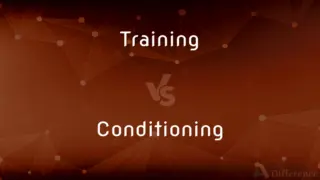Revise vs. Rephrase — What's the Difference?
By Maham Liaqat & Urooj Arif — Updated on April 4, 2024
Revise involves altering content for improvement or correction, while rephrase means changing the wording without altering the meaning.

Difference Between Revise and Rephrase
Table of Contents
ADVERTISEMENT
Key Differences
Revising a text or document involves examining and making changes to its content, structure, or format to enhance its clarity, effectiveness, or accuracy. This process can include correcting errors, reorganizing information, and refining arguments to better achieve the document's purpose. In contrast, rephrasing is focused solely on altering the words used to express an idea without changing the underlying meaning or content. Rephrasing is often done to clarify meaning, avoid repetition, or adjust the tone.
When you revise, you might engage in a comprehensive review that considers the work's overall coherence, the strength of its evidence, and its alignment with intended goals. It's a critical step in the writing process that ensures the final product effectively communicates its message to the intended audience. On the other hand, rephrasing typically occurs at the sentence level, aiming to improve readability or to present information in a more suitable or engaging way for the audience, without undertaking a thorough review of the work’s broader aspects.
Revision requires a deeper level of engagement with the text, including critical thinking about its structure and the validity of its arguments. It may lead to significant changes in the text, such as adding new information, removing irrelevant details, or adjusting the thesis. Rephrasing, while it can improve the text's clarity, does not involve this level of critical evaluation or alteration of the text’s core elements.
The decision to revise or rephrase depends on the writer's goals. If the aim is to improve the overall quality, coherence, and effectiveness of a text, revision is necessary. If the goal is simply to alter the expression of ideas for clarity, succinctness, or stylistic preferences, rephrasing is sufficient. Both processes are integral to producing high-quality writing, but they serve different purposes and involve different levels of textual engagement.
Both revising and rephrasing are important in the writing process, but they are applied based on what the text needs to become clearer, more accurate, or more engaging. While revision might lead to a significant overhaul of a piece, rephrasing is about fine-tuning the way ideas are presented without fundamentally changing the content.
ADVERTISEMENT
Comparison Chart
Purpose
To improve content, structure, or accuracy
To change wording without altering meaning
Focus
Content, organization, argumentation
Word choice, sentence structure
Engagement
In-depth, considering overall coherence and effectiveness
Sentence-level, focusing on clarity and style
Outcome
May significantly change the text
Maintains original meaning, alters expression
Application
Critical step in writing for clarity, effectiveness, and alignment with goals
Used for clarity, avoiding repetition, adjusting tone
Compare with Definitions
Revise
Changing the organization of information for better flow and coherence.
Revising the article's structure made the main points stand out more clearly.
Rephrase
Changing sentence structure or word choice to make the meaning clearer.
Rephrasing the technical jargon made the instructions accessible to a broader audience.
Revise
Fixing mistakes in grammar, spelling, and punctuation.
The revision process helped to eliminate all typographical errors from the document.
Rephrase
Improving the readability or appeal of a text through word choice.
By rephrasing awkward sentences, the writer made the article more engaging.
Revise
To alter a text to improve its content, structure, or clarity.
The author revised the manuscript to incorporate the editor's feedback on character development.
Rephrase
Modifying the wording to change the tone of a text.
Rephrasing the email made it sound more formal and professional.
Revise
Involves updating or adding new information to reflect current knowledge.
He revised the report to include the latest research findings.
Rephrase
To alter the wording of a sentence or passage without changing its meaning.
She rephrased the confusing sentence to make it easier for readers to understand.
Revise
Focuses on enhancing the overall quality or effectiveness of a text.
After revising her essay, the arguments were clearer and more persuasive.
Rephrase
Using different words or structures to express the same idea.
He rephrased his main point to avoid repetition and keep the audience engaged.
Revise
Examine and make corrections or alterations to (written or printed matter)
The book was published in 1960 and revised in 1968
Rephrase
To phrase again, especially to state in a new, clearer, or different way.
Revise
Reread work done previously to improve one's knowledge of a subject, typically to prepare for an examination
Revise your lecture notes on the topic
Students frantically revising for exams
Rephrase
To say or write something with different wording.
Revise
A proof including corrections made in an earlier proof
I handed in the revises this morning
Rephrase
Express the same message in different words
Revise
To alter or edit (a text).
Revise
To reconsider and change or modify
I have revised my opinion of him.
Revise
Chiefly British To study again (academic material, for example), as for a test; review.
Revise
To make revisions, as in a text.
Revise
Chiefly British To study something again; review.
Revise
(Informal) An act or product of revising; a revision.
Revise
(Printing) A proof made from an earlier proof on which corrections have been made.
Revise
To review, alter and amend, especially of written material.
This statute should be revised.
Revise
To look over again (something previously written or learned), especially in preparation for an examination.
I should be revising for my exam in a few days.
Revise
(obsolete) To look at again, to reflect on.
Revise
A review or a revision.
Revise
(printing) A second proof sheet; a proof sheet taken after the first or a subsequent correction.
Revise
To look at again for the detection of errors; to reëxamine; to review; to look over with care for correction; as, to revise a writing; to revise a translation.
Revise
To compare (a proof) with a previous proof of the same matter, and mark again such errors as have not been corrected in the type.
Revise
To review, alter, and amend; as, to revise statutes; to revise an agreement; to revise a dictionary.
Revise
A review; a revision.
Revise
A second proof sheet; a proof sheet taken after the first or a subsequent correction.
Revise
The act of rewriting something
Revise
Make revisions in;
Revise a thesis
Revise
Revise or reorganize, especially for the purpose of updating and improving;
We must retool the town's economy
Common Curiosities
Is revising more time-consuming than rephrasing?
Typically, yes, because revising involves a comprehensive examination and possible overhaul of a text, while rephrasing focuses on specific sentences or phrases.
Should I revise or rephrase my work first?
It's generally more efficient to revise first to ensure the content and structure are solid before focusing on rephrasing for clarity and style.
Can rephrasing affect the quality of a text?
Yes, rephrasing can enhance clarity, readability, and tone, indirectly improving the text's quality.
Can I rephrase without changing any key terms?
Yes, rephrasing can maintain key terms while altering sentence structure or using synonyms for non-critical words to maintain the original meaning.
What's the difference between revise and rephrase?
Revision involves changes to improve content and structure, while rephrasing changes wording without altering the underlying meaning.
Do professional writers revise their work?
Yes, professional writers often go through multiple rounds of revisions to refine their work, highlighting the importance of this process in producing high-quality writing.
Does revising always improve a text?
While the goal is improvement, ineffective revisions can sometimes detract from the original clarity or intent of the text. Skillful revising typically enhances a document.
Is it possible to revise too much?
Excessive revision can lead to overworking the text, possibly making it less clear or losing the original voice or intent.
Can rephrasing lead to misunderstandings?
If not done carefully, rephrasing can alter the intended meaning or nuance of the original text, potentially leading to misunderstandings.
How often should I revise my work?
The number of revisions depends on the work's initial quality and the desired outcome. Continuous revision until the text meets your objectives is advisable.
Share Your Discovery

Previous Comparison
Training vs. Conditioning
Next Comparison
Uplift vs. LiftAuthor Spotlight
Written by
Maham LiaqatCo-written by
Urooj ArifUrooj is a skilled content writer at Ask Difference, known for her exceptional ability to simplify complex topics into engaging and informative content. With a passion for research and a flair for clear, concise writing, she consistently delivers articles that resonate with our diverse audience.
















































